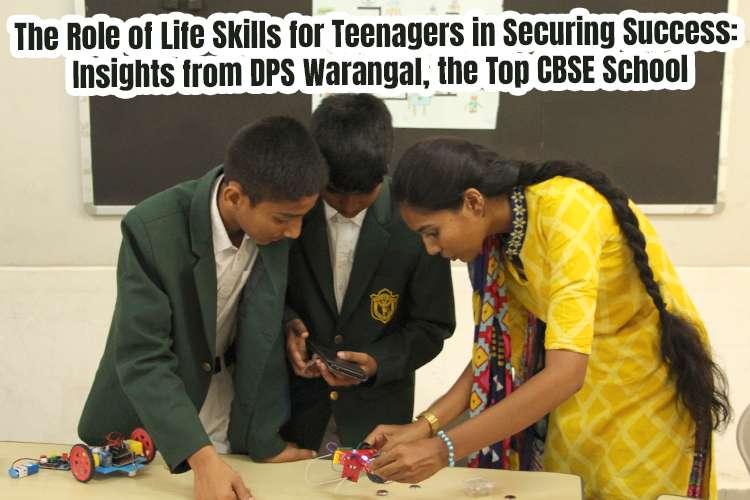Hailing from the era when my school served us the conventional buffet of English, Math, and Science, mixed with sprinkles of Physical Education (some casual running around), a 21st-century platter of education is a lot more robust and holistic. But, for many institutions even today, life skills remain an underserved part of the student’s life. Skills such as communication, problem-solving, and decision-making that once seemed as important are rarer because of the technological environment we’re operating in.
For the concrete-jungle survivors of tomorrow need more than Pythagoras or Shakespeare quotes rattling in their brains. The emphasis is on rounded individuals who can survive and thrive in the real world.
The Future: More Than Just Academics
At DPS Warangal, in line with our expertise, we aim to work with students where their emotional quotient (EQ) holds hands with their intelligence quotient (IQ).
Picture yourself as a straight-A student, ready to present your gold medal to your prospective employer. But what if you can’t convince people, coordinate with a team or empathize with the concerns of others? Oops, the employer has dropped the conversation. So, congratulations on your academic excellence, but unfortunately, it is often overlooked when companies search for productive employees. They want their report card to read “teamwork”, “leadership” and “adaptability” as loud as the “high GPA” song.
Please do not put down your pens and search for self-help guides just yet. We would not have earned the reputation of being the best CBSE school in town if we did not provide adequate support to our students. At DPS Warangal, we believe that while classes are for textbook learning, the playground, cafeteria, and other areas of the school are for developing life skills. We are dedicated to providing a comprehensive education in life skills, not just an introduction. Building these skills can be challenging, but we are committed to helping our students succeed.
Life Skills: A Comprehensive Approach
Dear young adults, it is imperative that we engage in a discussion regarding the importance of life skills. It has come to our attention that many of you may view extracurricular activities as mere additions to your academic pursuits. However, it is crucial to understand that life skills are not simply supplementary to your success, but rather, they form the very foundation upon which it is built.
At DPS Warangal, for example, life skills are not relegated to after-school activities, but are instead integrated into the daily curriculum. In addition to traditional academic subjects, students are also taught essential skills such as resilience, leadership, conflict resolution, empathy, and global citizenship. These skills are just as important as knowledge of academic subjects and should be given equal weight in one’s education.
The classrooms at DPS Warangal are dynamic learning environments, where students engage in a wide range of activities and discussions. From debating global issues to resolving conflicts with classmates, students are encouraged to develop their critical thinking and communication skills. The school places a strong emphasis on nurturing well-rounded individuals, rather than simply imparting academic knowledge.
It is important to understand that life skills cannot be found in a glossary or learned in a brief period at the end of the school day. Rather, they must be embraced as an integral part of one’s daily routine. Even seemingly mundane tasks, such as negotiating with a vendor, can provide valuable opportunities to develop and practice life skills. Life skills are not optional additions to one’s education, but rather, they form the very foundation upon which success is built.
The philosophy of life skills
The educational philosophy at DPS Warangal is not one of rigid adherence to academic pursuits, but rather, it is a holistic approach that integrates academic excellence with the development of essential life skills. With the motto of “Service before Self” the orientation is always towards self development, and giving back to the community that supports one, too. This perspective helps our students not only learn practical skills for survival, but equally foster empathy and a strong EQ. Students are taught practical skills such as laundry management and emotional regulation, in addition to traditional academic subjects such as algebra, or English. By using other extra curricular activities such as art, sport, and encouraging students to excel in this too, the aim of all the educators is to build well-rounded people. This comprehensive approach to education is what sets DPS Warangal apart from other institutions.
Day scholars vs residential schools: do they learn different life skills?
At DPS Warangal, we believe that a true education involves preparing young adults to face the challenges of the real world, with or without the guidance of their parents. Our residential and day school programs are designed to foster the development of well-rounded individuals, capable of navigating the complexities of modern life.
In our residential program, students are taught to be self-reliant and take responsibility for their actions. They are provided with a balanced curriculum that includes academics, extracurricular activities, and the development of essential life skills. This could be excursions to places of learning, and teaching them to mind themselves. Similarly, our day school program also offers ample opportunities for students to engage in activities that promote teamwork, critical thinking, and adaptability through competitions, daylong excursions, and inter school activities and events.
Our success stories speak for themselves. Our alumni have gone on to achieve great things, both academically and personally. They have demonstrated that life skills are indeed the key to success in the real world.
Enrolling your child at DPS Warangal is a simple process. Simply submit an application form and participate in an interaction session with our staff. We do not look for prodigies or geniuses, but rather, we seek to meet and get to know each individual student.


